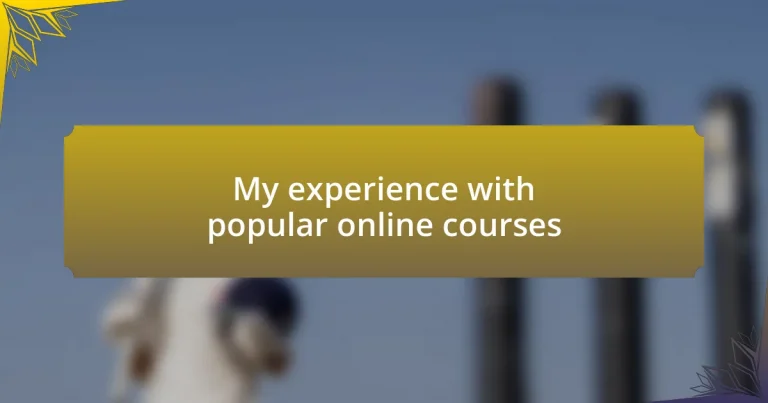Key takeaways:
- Online learning offers flexibility, allowing learners to study at their own pace and fit education around personal commitments.
- Choosing the right online course involves understanding personal learning goals, evaluating course quality, and aligning with one’s preferred learning style.
- Active engagement with course materials and community can greatly enhance the learning experience and enrich understanding.
- Personal motivation and establishing a consistent study routine are critical for course effectiveness and overall success in online education.
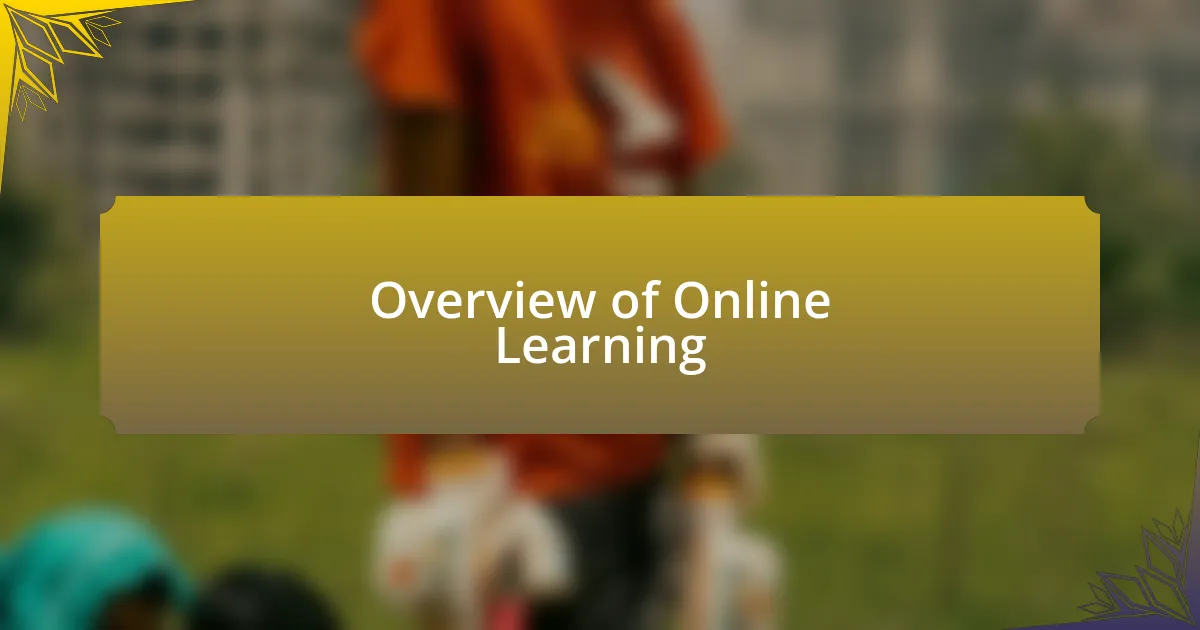
Overview of Online Learning
Online learning has transformed education, opening doors for learners around the globe. I remember the thrill of logging into my first virtual classroom; it felt revolutionary. The flexibility that comes with online courses means I can learn at my own pace, fitting my studies around life’s demands. How many times have we struggled to juggle a busy schedule? Online learning offers a solution.
As I dived deeper into various platforms, I felt a mix of excitement and apprehension. With countless courses available, it was like wandering into an endless buffet of knowledge. This abundance raises an important question: how do we choose the right one? It’s essential to consider not just the course content but also the teaching style, community engagement, and support systems offered by these programs.
In my experience, the interactive elements, like discussion forums and group projects, often breathe life into the learning process. I found that sharing insights with fellow students brought a sense of camaraderie, transforming what could be a solitary venture into a communal journey. Have you ever felt more motivated after discussing an idea with someone? That connection can really enhance the online learning experience.
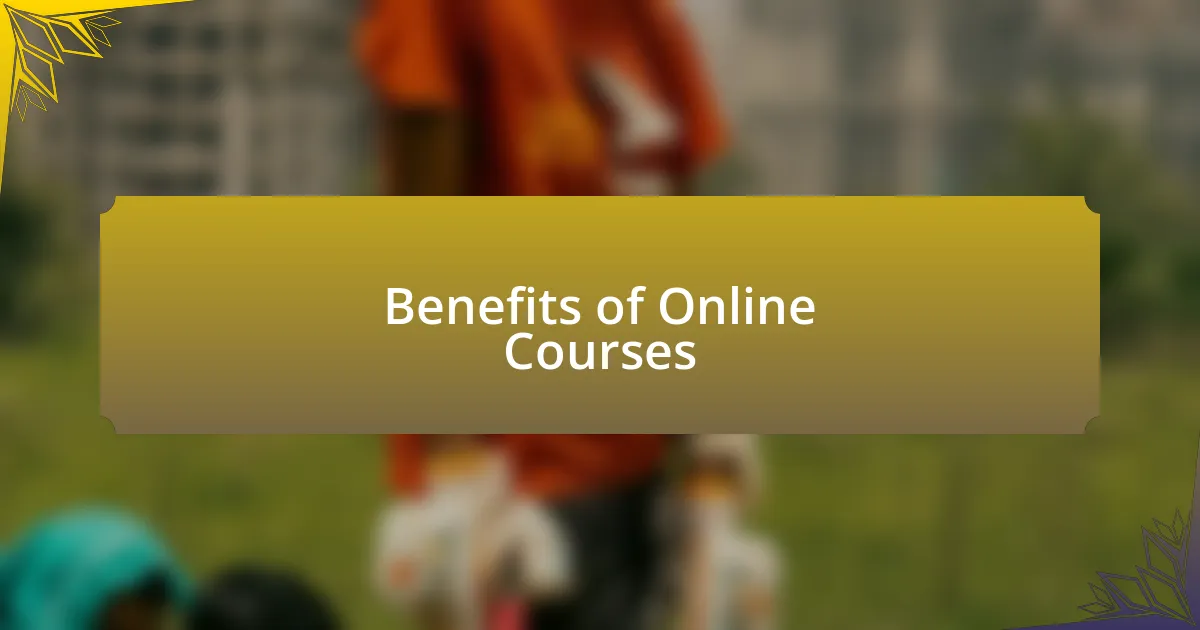
Benefits of Online Courses
Online courses provide exceptional flexibility, a feature I truly value as a lifelong learner. I remember continuously adjusting my study schedule to fit around work commitments and family obligations. The ability to access lectures and materials anytime, from anywhere, transformed my learning journey. This flexibility not only alleviated stress but also allowed me to fully engage with the content without feeling rushed.
The advantages extend beyond just scheduling. Here are several benefits I’ve observed:
- Accessibility: Courses are available worldwide, making high-quality education reachable for everyone.
- Variety of Subjects: There’s an incredible range of topics, allowing learners to explore diverse interests.
- Cost-Effectiveness: Many online courses are more affordable than traditional education, opening doors for many.
- Self-Paced Learning: I often revisit complex modules at my own pace, ensuring I grasp each concept fully.
- Networking Opportunities: Engaging with peers globally can lead to invaluable connections. I once collaborated with a student from a different country, which enriched my perspective on the subject matter.
This blend of benefits makes online courses a practical choice for many learners, reflecting a truly modern approach to education that resonates with the way we live today.
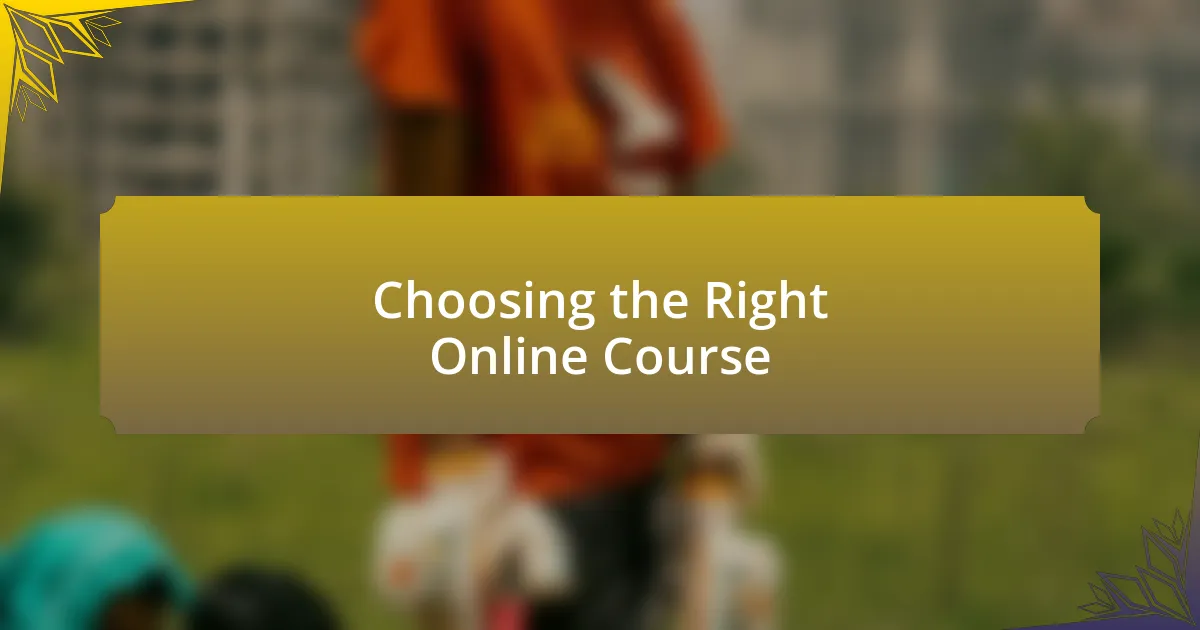
Choosing the Right Online Course
Choosing the right online course can feel overwhelming, especially with so many options available. I remember when I first started looking for courses; I was excited but also a bit lost. One thing I found helpful was to identify what I truly wanted to learn. Did I want technical skills, or was I more interested in personal development? This clarity helped me narrow down my choices significantly.
Moreover, evaluating course quality is vital. I often check reviews and sample materials before enrolling. For example, I took a course on digital marketing that had glowing reviews, but I later realized the content was outdated. Taking time to assess not only the instructor’s expertise but also the curriculum ensures I am spending my time and money wisely. It can be disheartening to invest in a course that doesn’t deliver, so this step is crucial.
Lastly, I’ve found that learning style plays an important role in choosing a course. Some people thrive in structured environments, while others prefer a more relaxed approach. Personally, I enjoy courses that mix videos with practical assignments. This format keeps me engaged and helps consolidate my learning effectively. Understanding how you learn best can guide you toward the right online course tailored to your needs.
| Criteria | Considerations |
|---|---|
| Learning Objectives | Define what you want to achieve |
| Course Quality | Research reviews and check credentials |
| Learning Style | Identify if you prefer video, text, or interactive elements |
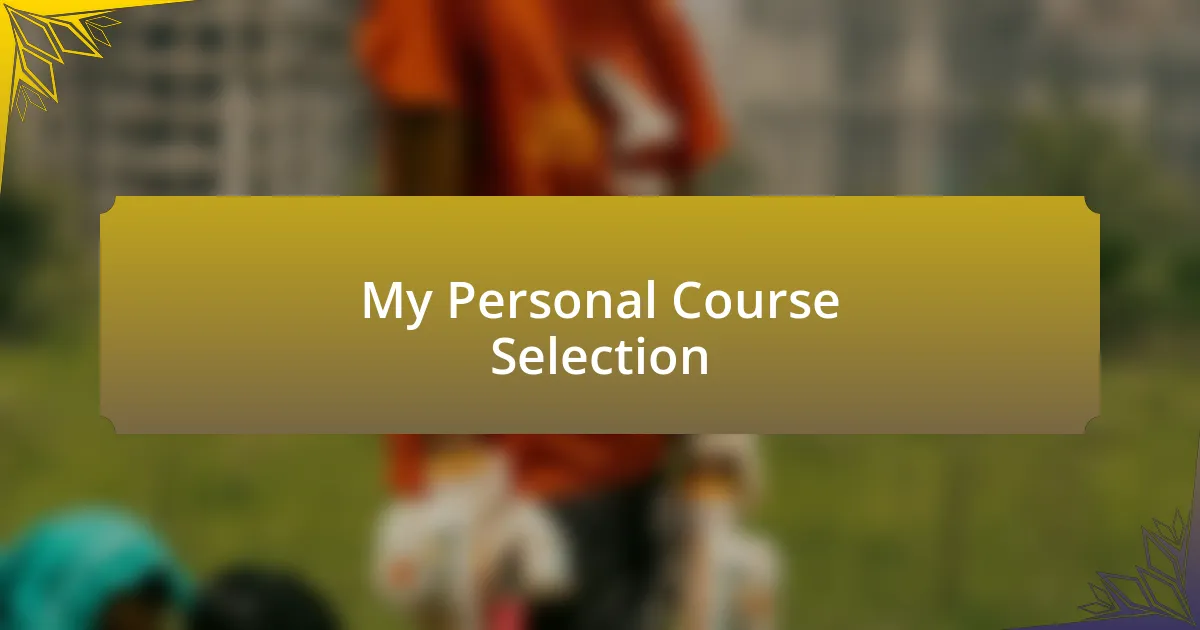
My Personal Course Selection
When it came to selecting my online courses, I often found myself reevaluating my motivations. I vividly recall signing up for a graphic design course, thinking it would enhance my artistic skills. However, after a few modules, I realized my true interest lay more in branding than pure design. This self-awareness not only reshaped my educational journey but also energized my pursuit of relevant knowledge.
During my course search, I encountered a few courses that seemed appealing at first glance but didn’t resonate once I delved deeper. For instance, I enrolled in a coding bootcamp that promised to make me job-ready in mere weeks. While the course structure looked enticing, the fast pace left me overwhelmed. It made me realize how essential it is to balance ambition with realistic expectations when choosing a course.
Another factor I consider is community engagement. Some of the best experiences I’ve had were in courses with vibrant discussion forums. In one digital marketing class, I forged connections with peers who shared insights and challenges. This collaborative aspect was invaluable; it made learning feel less isolated and more like a shared journey. Have you ever felt that sense of camaraderie while learning online? It’s a game-changer, transforming the learning experience into something far more enriching.
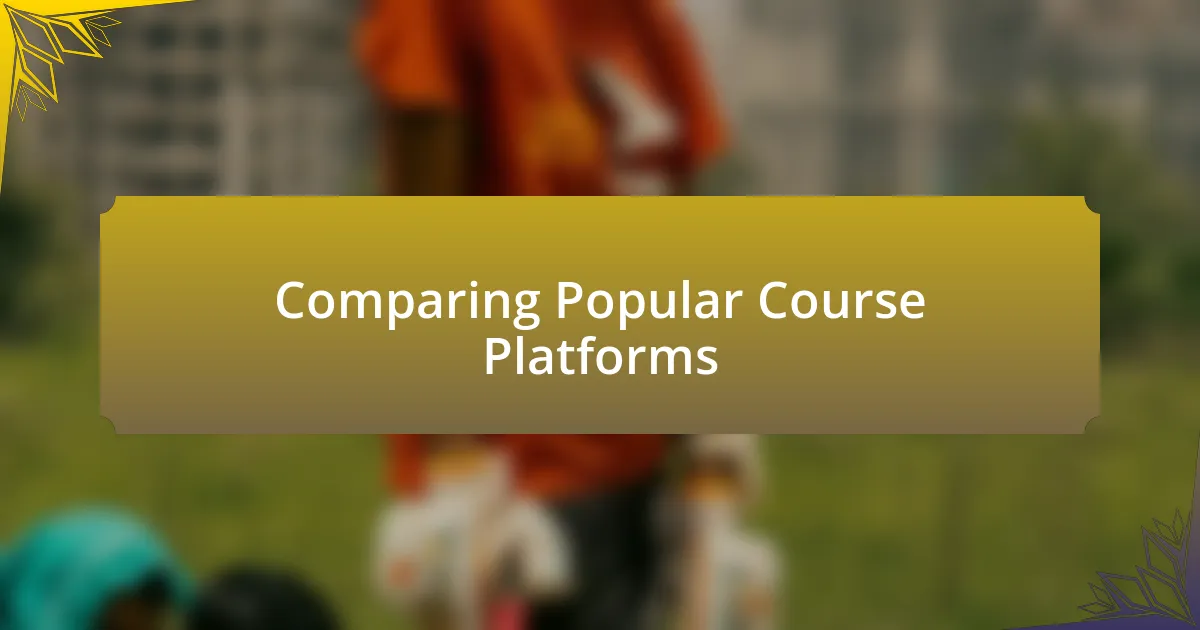
Comparing Popular Course Platforms
When exploring popular online course platforms, I’ve often found myself weighing their unique features against my personal learning needs. For example, I initially favored a platform that advertised an extensive library of courses. However, I quickly discovered that a well-structured, smaller selection often offered deeper insights and a more tailored educational experience. How can a vast quantity of courses be effective if they don’t resonate with your goals?
Another noteworthy comparison stems from user experience. I once enrolled in a platform where the interface felt cluttered and confusing. Navigating through courses became a chore rather than an exciting adventure, which impacted my motivation. What I learned from this is that an intuitive layout and seamless navigation can make all the difference in keeping learners engaged and committed.
Community interaction also varies significantly among platforms. I recall participating in a course where peers were actively sharing projects and feedback, creating a thriving environment. This engagement not only enhanced my understanding but also fostered friendships that extended beyond the course. Does the platform you choose encourage a community spirit? That aspect can truly elevate your learning experience.
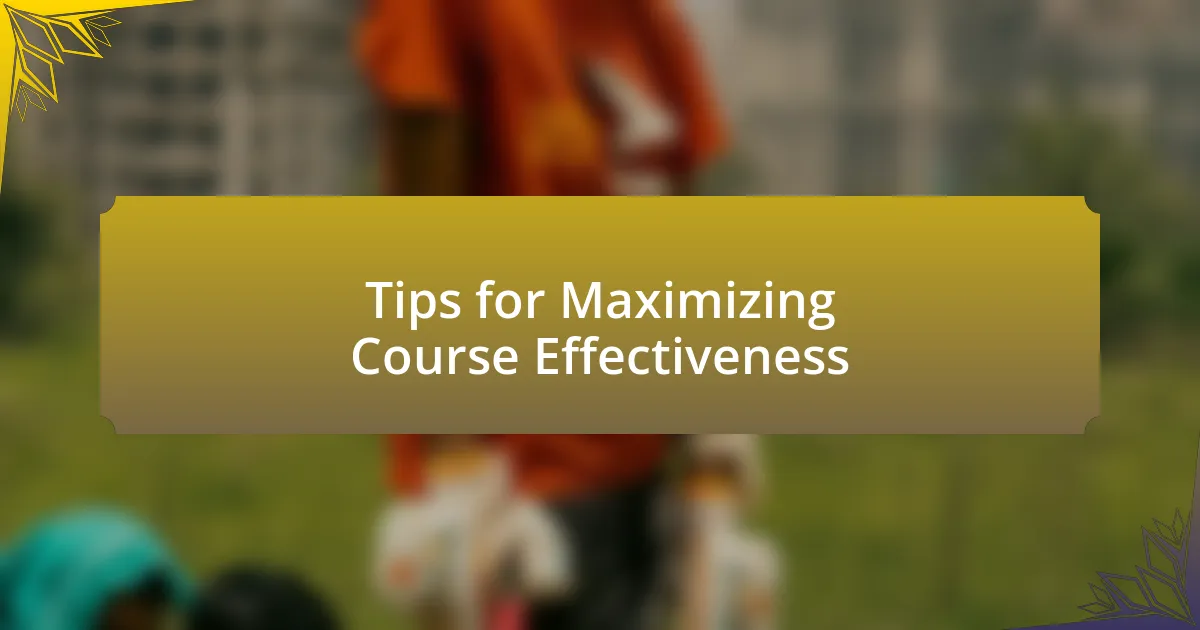
Tips for Maximizing Course Effectiveness
When you’re taking an online course, setting clear goals can significantly boost your effectiveness. I remember enrolling in a graphic design course and setting a personal objective to complete a project that had been sitting on my to-do list for months. By breaking down tasks and keeping my end goal in sight, I found myself more focused and motivated. Have you tried this approach? It can help you stay on track and make the learning process more purposeful.
Another strategy that worked wonders for me was to establish a regular routine. Life can easily interrupt plans, but committing to a consistent study schedule made all the difference. I carved out time each morning, treating my coursework like an important appointment. This helped me cultivate a mindset where learning became part of my daily rhythm, rather than a sporadic effort. Think about your own schedule—what time can be devoted to your courses that would help you develop this habit?
Engaging with course materials actively is another approach that cannot be overlooked. Instead of passively watching videos, I took notes and participated in the discussion forums. When I made it a point to ask questions and share my thoughts with others, it not only deepened my comprehension but also created a dynamic conversation that enriched the learning experience. Have you engaged actively in your courses? It’s amazing how much more you can absorb when you interact with the content and community around you.
